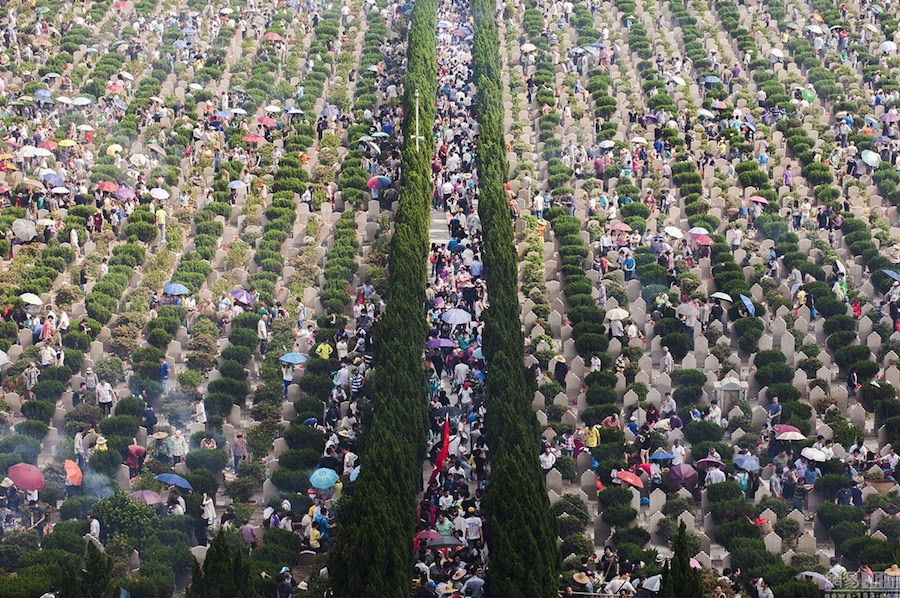Qingming Festival (清明节) is one of the most important traditional Chinese festivals, also known as the Tomb-Sweeping Day. “Qingming” literally means “clear and bright” in Chinese, which is a very suitable name, given its history and meaning.
History & Origin
This holiday has a history of more than 2,500 years and is celebrated ever since the Zhou Dynasty (510-314 BC).
The ancients believed that fifteen days after the spring equinox, a “Qingming” breeze comes from the southwest. It clears out the cold winter air allowing temperatures to rise and rainfall to increase. Everything will start to grow from plants and flowers to cultivated crops including tea.
Qingming Festival Date
The Qingming festival takes place at the 5th solar term (out of the 24 solar terms). On the Western calendar, the festival takes place on April the 4th, 5th or 6th.
Customs Tomb Sweeping, Sacrifices & Lucky Money
To the Chinese people, the Qingming Festival has a far greater significance than just a solar term. Influenced by the Han culture, 24 ethnic groups in China such as the Manchu, Zhuang, Dong, Tujia, Miao, Yao, and Li also celebrate Qingming Festival.
 Although local customs are not exactly the same, tomb-sweeping, burning paper money and offering sacrifices for the ancestors, and outings are the basic themes. There are rituals like burning incense and paper money, hoping the ancestors rest in peace and bless the offspring.
Although local customs are not exactly the same, tomb-sweeping, burning paper money and offering sacrifices for the ancestors, and outings are the basic themes. There are rituals like burning incense and paper money, hoping the ancestors rest in peace and bless the offspring.
In Zhejiang Province area, people place new offerings such as fresh water snails, green glutinous rice dumplings in front of ancestors tombs. Other offerings include flowers and yellow rice wine. At the end of the ceremony, the children who are watching the ceremony will receive “lucky money” as a blessing.
In Hainan, After sweeping ancestors’ tombs, people will place dishes of pork, fish and geese, as well as various pastries in front of the graves.
There are also special dishes that Chinese people love to make during this holiday, including green glutinous rice dumpling (qingtuan) and fried rice with veggies (芥菜饭).
Green Glutinous Rice Dumplings (Qingtuan)

The tradition of having qingtuan during Qingming Festival evolved from an ancient Chinese festival called Cold Food Festival (one or two days before Qing ming). The custom of the Cold Food Festival is that you can’t make a fire and cook food. You can only eat food that you don’t need to heat up before eating. The qingtuan is one of the foods that can be done well a day in advance and can satisfy the hunger. Later, the Cold Food Festival gradually developed into the Ching Ming Festival, and the qingtuan that was eaten during the Cold Food Festival became the necessary food for the Ching Ming Festival in eastern and southern China.
The green colour of the pastry comes from the mugwort leaves. The fresh tender leaves are crushed and squeezed out of the green juice, and added to the glutinous rice flour. Adding mugwort juice not only brings a unique fragrance, but also brings the colour green that represents spring. The stuffing of the qingtuan varies. Some have sweet taste made with sugar, red bean paste, sesame seeds and peanuts; some have salty taste made with mushrooms, bamboo shoots and minced meat. In the past few years, the stuffing has been more innovative, such as a variety of fruity flavors.
Qingtuan are usually cooked in a steamer. Right after they are done, people will brush vegetable oil evenly on the surface of the dumplings to prevent sticking. Later they can be offered as a dish on the table for the living, as a snack on the road, and as the offering in front of the tomb for the ancestors.
Qingming Activities
Qingming Festival is not just about tomb-sweeping and sadness. With the pleasantly warm weather, people get out of the door for Spring outings too. In addition to enjoy the Spring scenery, people carry out various recreational activities such as kite flying and tug of war.
After the tomb-sweeping, the traditional is to fly a kite near the cemetery. The ancients believed that flying kites could let go of their bad luck. They write about their troubles on the kites, when the kites are raised, they cut the lines and let the wind carry them away. This symbolizes that their illness and bad luck will go way with the kites.
Nowadays people don’t cut off the kite lines anymore, but the tradition of kite flying stays.

Mingqian Tea
Many southern regions still retain the customs of Qingming tea-offering for ancestors. During the tomb-sweeping ceremony, tea is poured into tea cups and sprinkled in front of the graves of the deceased relatives to show respect and remembrance.

The term “Qingming tea” refers to early spring tea. Spring tea is generally not harmed by the pests. The tea buds are tender and soft and pesticides-free.
There is another term called “Mingqian tea”, which refers tea picked before the Qingming Festival. It’s the very first batch tea picked in the whole year. Since the temperature is generally low the rainfall is deficient before Qingming Festival, the growth of the tea tree is limited. Therefore, the tea buds that meet the picking standards are scarce.
Mingqian tea is rare and expensive but many people love to try because of its fresh aroma. There is a saying that goes: “Mingqian tea is as expensive as gold.”
Discover more from Hello Tea Cup
Subscribe to get the latest posts sent to your email.



No Comments